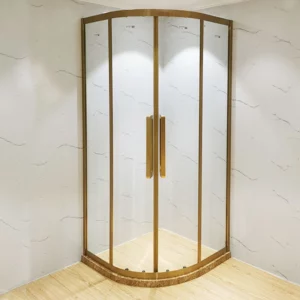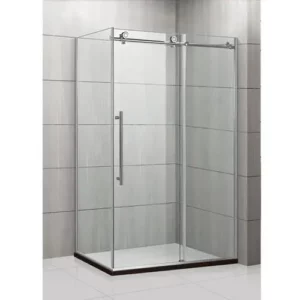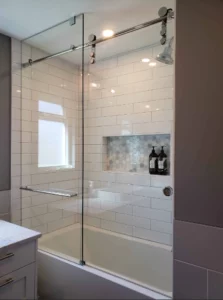When considering a bathroom renovation or update, one key element often demands special attention: the bathtub surround. This component is not just a practical necessity; it can be a major design statement, tying together the aesthetics of your bathroom with functionality. With the myriad of options available, the burning question remains: What is the best option for a bathtub surround? In this blog post, we will explore the various types and materials, focusing on factors to consider and showcasing why Crown bathtub surrounds could be the top choice for your space.


Acrylic tub surround panels have become a popular choice for modern bathroom renovations. With their sleek look and easy installation, they offer several advantages over traditional tiles.
Unlike tiles, which require grout and precise placement, acrylic panels can be easily glued to the wall, making them a more convenient option for DIY enthusiasts.
Acrylic is a non-porous material, meaning it resists mold and mildew better than grout lines in tiled walls. This makes them a more durable and low-maintenance option.
Though the initial cost may be similar to that of high-end tiles, the lack of additional materials like grout and sealants make acrylic panels a cost-effective long-term investment.
Acrylic panels offer a smooth and continuous look that can make a bathroom feel larger and more open, whereas tiles can sometimes visually break up the space.
With a range of colors and patterns, including options that mimic natural materials, homeowners can find acrylic tub surround panels to match any bathroom aesthetic.
Being waterproof, acrylic panels safeguard the walls from water damage, a common issue in bathrooms with poor tile installation.
Acrylic has good heat retention properties, which can help keep bathwater warm longer than a tiled surround.
If damage occurs, an acrylic panel can often be repaired or replaced more easily than a section of tile, saving on labor and materials.
The non-porous surface of acrylic makes it resistant to bacteria and stains, promoting a hygienic bathroom environment.
Modern and sleek, high-quality acrylic surrounds can increase the appeal and value of a home on the market.
When renovating a bathroom, selecting the right tub surround panels from retailers like Lowe’s can be a significant decision. Here’s what to consider:
Your bathroom’s current or intended style will guide your selection. Look for panels that complement the overall design theme.
Before shopping, measure your space accurately. Lowe’s offers various sizes, and choosing the right fit is crucial.
Lowe’s carries different materials. Evaluate the durability and maintenance needs of each to ensure a lasting investment.
Choose colors and textures that will harmonize with your bathroom’s palette and lighting conditions.
Set a budget before browsing. Lowe’s has options ranging from budget-friendly to premium, affecting material and design quality.
Consider the complexity of installation. Some panels from Lowe’s are designed for easy, DIY-friendly installation.
Some panels come with shelves and soap dishes. Decide what additional features you might want for convenience.
Check the warranty provided by Lowe’s for your chosen panels and the customer support available post-purchase.
Look at customer reviews and ratings on Lowe’s website to gauge satisfaction and common issues with the panels.
Don’t hesitate to ask Lowe’s staff for their expertise, especially regarding compatibility with your existing bathroom fixtures.
For homeowners on a budget, finding affordable bathtub surround options that offer both quality and style is key.
Sometimes, the most cost-effective option is to refurbish what you already have. A professional refinish can make old tiles look new.
Purchasing a DIY universal tub surround kit can save on labor costs. These kits often come with everything needed for installation.
There are materials like fiberglass that are generally cheaper than premium options but still offer durability and an attractive appearance.
Hunting for overstock or discontinued models can lead to significant savings on high-quality surrounds.
Mixing Materials
Consider using a mix of materials. Higher-end materials can be used as accents alongside more affordable ones to create a custom look.
Opt for simple, classic designs which are typically less expensive than their ornate counterparts.
If you’re renovating multiple bathrooms, you may save by buying in bulk. Retailers often offer discounts for large purchases.
If you know someone in the trade, you might be able to purchase through them at a discount.
Keep an eye on sales and clearance events, both in-store and online, for reduced prices on bathtub surrounds.
Explore options beyond the big-box stores. Local hardware stores and online marketplaces can sometimes offer better deals.
Installing glue-up tub surround panels is a project many homeowners choose to undertake themselves. Here’s what to know before starting:
Ensure your Bathroom has enough space to maneuver large panels and that the walls are clean, dry, and smooth.
Select an adhesive recommended for the type of panels you’re installing. It should be waterproof and suitable for bathroom use.
Before applying any adhesive, dry fit the panels to ensure they align properly with your bathroom’s dimensions.
You may need to cut the panels to fit around plumbing or other fixtures. Use the correct tools to avoid cracking or chipping.
Spread adhesive evenly on the back of the panels and the wall, following the manufacturer’s instructions for the best hold.
Press the panels firmly against the wall, starting from the bottom up, ensuring there are no bubbles or gaps.
Use a bathroom-grade sealant around the edges to prevent water from seeping behind the panels.
Allow the adhesive and sealant to cure fully before using the shower or bath. This usually takes at least 24 hours.
After installation, clean any excess adhesive or sealant immediately with the appropriate solvents.
Regularly clean the panels according to the manufacturer’s guidelines to maintain the integrity of the adhesive and the appearance of the panels.
Choosing a bathtub panel involves more than just picking out a color. Here are design considerations to bear in mind:
The size and layout of your bathroom will affect the scale and placement of the panel. In smaller bathrooms, consider panels that add a sense of space.
Your current decor will influence the style of the panel. Aim for consistency with your bathroom’s design theme.
Some panels come with built-in shelves or soap dishes. Consider what functional features you may want.
Bathtub panels come in materials like acrylic, fiberglass, and solid surface. Each has different durability and maintenance needs.
Choose a color and texture that complements or contrasts with your bathroom tiles and fixtures.
Consider how natural and artificial light will interact with the panel’s material and color, affecting the overall mood of the space.
Think about how much time you’re willing to dedicate to cleaning. Some materials and finishes are easier to maintain than others.
Some panels are designed for easy, DIY installation, while others might require professional assistance.
Consider how the design will age over time and if it will adapt to potential future renovations.
Ultimately, your personal taste should guide your choice. The panel should make you feel comfortable and happy in your bathroom space.
Affordable can still be stylish and durable. Here are ways to find cheap tub surround ideas without sacrificing quality:
From fiberglass to solid surface composites, prices can vary. Find the best balance between cost and quality.
Acrylic is often a more affordable alternative to materials like stone or tile, and it comes in various styles and finishes.
Check for sales, clearance items, and special offers at both brick-and-mortar stores and online retailers.
Choosing a surround that you can install yourself can save money that would otherwise go to a professional.
Opt for a straightforward, classic design which tends to be less expensive than more intricate styles.
Combine different materials and pieces to create a unique look without breaking the bank.
If the current tiles are in good condition, consider painting them for a fresh look at a lower cost.
Updating just part of the surround can give your bathroom a fresh look without the cost of a full replacement.
Look for salvaged materials that can be repurposed or refurbished to serve as tub surrounds. Local salvage shops or online marketplaces can be excellent sources for such materials.
If you’re set on tile, consider using less expensive tiles as the majority of your surround and splurging on a few decorative tiles to create an accent.
Choose materials that are easy to clean and maintain, which can save money in the long run by extending the life of the surround.
Remember, finding a balance between cost, durability, and style is key when searching for cheap tub surround ideas.
Selecting a tub and surround combo involves several considerations to ensure you choose the right fit for your space and needs.
Measure the bathroom space to ensure the combo fits comfortably and allows for easy movement within the room.
The combo should match the bathroom’s existing style or the style you intend to create through renovation.
Combo units come in various materials. Consider the aesthetics, durability, and maintenance of each.
Understand the plumbing and support requirements for the combo unit. This may influence your choice if you’re seeking a more straightforward installation process.
Ensure that the tub portion of the combo is comfortable for bathing and the surround provides adequate space and functionality.
Some combos come with built-in shelves, seats, or even whirlpool jets. Decide what features are important for your bathing experience.
Investigate the quality of the combo and the warranty provided. It should promise longevity and performance.
Combos can range from very affordable to very expensive. Set a budget and stick to it, considering the long-term value.
Look for a combo that is easy to clean, with non-porous surfaces that resist mold and mildew.
Consider how the combo will affect the resale value of your home. A well-chosen unit can be a selling point.
Tub surround panels are made from a variety of materials, each with its own set of benefits and considerations.
Acrylic panels are lightweight, easy to install, and come in a range of colors and textures. They are also durable and easy to clean.
Fiberglass is another common material that is affordable and has a relatively straightforward installation process. It’s less durable than acrylic but can be a good budget option.
Solid surface materials offer a seamless look and can be custom-fitted to your space. They’re durable and repairable but at a higher price point.
Ceramic or porcelain tiles provide a classic look and endless design possibilities. However, they require more maintenance and a more complicated installation process.
Natural stone options like marble and granite provide a luxurious look but are costly and require regular maintenance to prevent staining.
| Material | Durability | Maintenance | Installation | Cost |
|---|---|---|---|---|
| Acrylic | High | Low | Easy | Medium |
| Fiberglass | Medium | Medium | Easy | Low |
| Solid Surface | High | Low | Medium | High |
| Tile | High | High | Hard | Medium |
| Natural Stone | High | High | Hard | High |
This comparison can help in making an informed decision based on your specific needs and budget.
The industry has seen advancements in both the materials used for tub surrounds and the methods used to install them.
Newer surrounds eliminate grout lines, reducing mold risks and maintenance.
Some panels are designed to interlock, which simplifies the installation process and ensures a watertight fit.
Trim molding kits can provide a finished look without the need for professional tools or skills.
Peel-and-stick tiles or panels can be an option for an easy and quick update to your tub surround.
Flexible materials that can contour to walls with imperfections are becoming more available, reducing the need for extensive wall preparation.
Advancements in waterproofing technology ensure that even DIY installations can protect against water damage effectively.
Some materials now include soundproofing qualities, offering a more relaxing and quiet bathing experience.
Materials with better thermal insulation help retain heat, making for a warmer bath and potentially reducing energy costs.
There are more eco-friendly materials that are both sustainable and suitable for tub surrounds, catering to environmentally conscious consumers.
Advancements in manufacturing have made it easier to order custom sizes and shapes, allowing for a perfect fit in any bathroom layout.
With these innovations, the process of selecting and installing tub surround panels is becoming more personalized, efficient, and adaptable to individual needs and preferences.
Understanding Bathtub Surrounds
A bathtub surround refers to the material that covers the walls around a bathtub. These can range from tiled designs to sheet surrounds, and they serve both an aesthetic and practical function, providing a water-resistant barrier and adding to the overall design of the room. Common materials include tile, acrylic, fiberglass, solid surface materials, and natural stone, each with its unique qualities.
Factors to Consider When Choosing a Bathtub Surround
When it’s time to select a surround for your bathtub, several factors come into play:
Durability and Maintenance Requirements: You’ll want a surround that can withstand daily use and is easy to maintain.
Aesthetic Appeal and Design Compatibility: The surround should complement your bathroom’s design and enhance its overall appeal.
Water Resistance and Ease of Cleaning: In a bathroom, water resistance is a must, and ease of cleaning will make your life easier.
Installation Process and Compatibility with Existing Plumbing: Consider how the surround will fit with your current plumbing and how easy it is to install.
Cost-effectiveness and Long-term Value: Evaluate the surround’s cost, considering both upfront expenses and long-term value.
Types of Bathtub Surrounds
Each type of bathtub surround comes with its own set of advantages and challenges:
Tile Surrounds: Offer a wide range of design options but can be labor-intensive to install. They require regular maintenance to keep grout lines clean and free from mold.
Acrylic Surrounds: These are low-maintenance and easy to clean, but they may lack the high-end look of other materials.
Fiberglass Options: Fiberglass is durable and lightweight but may not offer the same luxury feel as other materials.
Solid Surface Surrounds: These can be customized to fit any design and are known for durability, though they can be more expensive.
Natural Stone Surrounds: Stone brings a touch of luxury and uniqueness, but it requires more maintenance and can be quite costly.
Brand Spotlight: Crown Bathtub Surrounds
Crown is recognized as a leading brand in the world of bathroom fittings, with a reputation for quality and innovation (see Crown collections). Their surrounds are known for their superior materials, craftsmanship, and timeless designs. Crown surrounds are not only visually appealing but also built to last, ensuring that your bathroom will remain at the forefront of style and functionality for years to come.
Comparison Table: Bathtub Surround Options
Here’s a table comparing the different materials for bathtub surrounds, helping you to make an informed decision:
| Material | Durability | Cost | Maintenance Required | Aesthetic Appeal |
|---|---|---|---|---|
| Tile | High | High | Regular | Customizable |
| Acrylic | Moderate | Low | Low | Modern |
| Fiberglass | Moderate | Low | Low | Basic |
| Solid Surface | High | High | Moderate | High-end |
| Natural Stone | High | High | High | Luxurious |
Each material has its pros and cons, and the right choice depends on your individual needs and preferences.
Case Studies or Testimonials
Real-life stories can often be the most compelling evidence of a product’s value. Crown bathtub surrounds have transformed many bathrooms, as evidenced by the glowing testimonials from satisfied customers. Before-and-after photos from these projects underscore the transformative power of a quality surround. (Here, you would feature specific testimonials or case studies.)
Installation Considerations
Choosing between DIY and professional installation is another significant consideration. While some surrounds are more DIY-friendly, others, especially heavy or complex materials like natural stone, may require professional installation. When opting for Crown products, selecting the right installer is crucial for achieving the best results. Learn more about installation services.
Maintenance and Care
Proper maintenance is key to extending the life and beauty of your bathtub surround. Here are some general care tips:
For specific guidance on maintaining Crown surrounds, consult our detailed care instructions on our maintenance tips blog.
Conclusion
Selecting the right bathtub surround is a nuanced process that involves considering durability, design, maintenance, and budget. Crown bathtub surrounds emerge as a strong contender in all these areas, offering an array of choices to suit any taste and requirement. With Crown, you can elevate the look and feel of your bathroom to a luxurious sanctuary.
Further Reading/Related Resources
To further enrich your knowledge about bathroom renovations, explore the following resources:
Dive deeper into the world of bathroom aesthetics and functionality with these carefully curated articles and emerge with inspiration for your next project.

The African commercial shower market presents unprecedented growth opportunities. Our Shower Enclosure Distributor Network connects

Introduction The African shower enclosure market continues to expand rapidly in 2025. Commercial construction growth

The African commercial shower enclosure market presents remarkable opportunities for manufacturers and distributors. Our comprehensive
